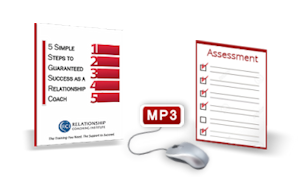 This is a common question of our trainees. Training to become a successful relationship coach requires practicing your skills with real clients, but how?
This is a common question of our trainees. Training to become a successful relationship coach requires practicing your skills with real clients, but how?
Should you charge these early clients? How long should you take on free or discounted practice clients?
Here’s how we suggest making the transition from getting free practice clients to charging your full fee during and after your relationship coach training.
Four Steps from Newbie to Full Fee Coach
Step 1: You’re just starting your training and need “people to practice with” for a single coaching conversation (could be anybody at any time) or to practice a training exercise with.
Step 2: You know enough about coaching to be helpful and are ready to take on practice clients, starting with one to put your toe in the water. This can be anybody who has a specific goal or problem and you practice your coaching skills to help them accomplish that goal or solve that problem (without giving advice, opinions, suggestions, etc).
Step 3: You’ve successfully helped enough practice clients to have some confidence in your coaching skills and ability to get results for your clients and are ready to start charging for your services. Decide upon an initial discounted coaching package (I suggest 90 days), a deadline or expiration date, and reach out to connect with potential clients, individually (it’s not “launch” time yet), as well as asking for referrals. Be very clear and transparent that you’re still in training (though probably near completion), this is a one time opportunity to hire a coach at a deeply discounted rate and communicate your deadline/expiration date (and stick to it!). After that, full fee for everyone, no discounts ever. Don’t accept one time consultations as coaching is only effective over time and you want to help your clients with a big goal or challenge, not provide a quick fix. So stick to your coaching package, which is the precursor of your coaching “program.” Also be sure to limit the number of discounted clients/coaching packages you accept. Remember, the purpose is to leap to full fee, not become the popular “discount coach.”
Reminder: If you rely on giving suggestions and advice for your value, you are a consultant, not a coach. Consulting is a valid professional service, but limited in it’s effectiveness as it relies on the client to be able to execute your recommendations. The whole purpose and value of coaching is to support and empower your client to get into action and overcome their fears, resistance, and other internal obstacles to doing so, which consulting doesn’t address. And, no, you can’t do both with your client.
Step 4: Assuming you now have a specialty and niche, and have put together a coaching program for that speciality and niche during the time it took you to get this far, now it’s time to launch! Full fee for everyone, no discounts (be sure to review the tips and strategies in the 5 Secrets program mentioned below for doing this, including the sponsorship and pro bono strategies).
If you’re in relationship coach training and reading this I’m sure you have questions about “how long,” and “how many,” and “how much,” and “how when do I know I’m ready?” Those answers are judgments calls that only you can make, but feel free to reach out to us at each step for clarity and support.
What’s next? For the specific steps needed to get clients be sure to carefully review the 5 Secrets of Client Enrollment available to RCI members and registrants of our free Relationship Coach Starter Kit, which applies to practice clients as well as full fee clients.

